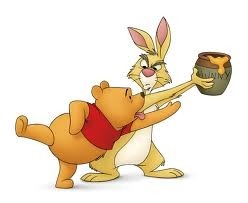SNARKALICIOUS COMMUNICATION: THE 4 STYLES

I'm Bossy. So?
I'm a Rabbit.
Wha?
No, not talking Chinese New Year symbols. (For the record, I'm a dragon. There's a surprise.)
Today we're discussing communication styles. Which I suppose is fitting given that I write about Mancode and Chickspeak.
But today I'm taking a slightly…different view.
Some people say we all relate to a character in the Pooh series: Pooh (or Piglet), Eeyore, Tigger, or Rabbit.
Me: Which one are you, honey?
Husband: Mickey Mouse.
Welcome to my life.
Let's deconstruct.
THE FOUR STYLES: There are four basic communication styles (using the Pooh model):
Relationship
Friendly (Pooh, Piglet)
Dramatic (Tigger)
Analytical (Eeyore)
Bossy (Rabbit)
Task
You, me, even your dog have a communication style that falls into one of these four categories. Feel free to disagree – years of data prove you wrong.
(These are not personality styles – these are communication styles – different. If you are an Analytical aka Eeyore, don't think I'm calling you a Negative Nancy #thoughyouprobablyare. It's only a model #deargod).
Anyway.
MY STYLE: I fall into the Bossy category – I can be a pushy little thing. No surprise there. I tend to be assertive and task oriented. Which isn't to say I can't also be a marshmallow at times – but my preferred style of communication, that I automatically go to, that my brain is wired for, is to be bossy, assertive, and focused on the task at hand. (Once that's done, then I give out hugs. Maybe.)
This means I make decisions fairly quickly based on a minimal amount of information and I don't dither once I've made that decision; I'm a leader if I feel it's worth getting the task done; I will consult others if I feel I need to in order to make the right decision but not always – usually I'll just do research and make my decision based on that; I'm a rebel to an extent — I don't go along with the pack and don't care what others think of me (just read either of my books if you want proof of that); I will fight for my rights and I'm fiercely loyal to those who are loyal to me.
Z-OUT: Which means I'll go from my Bossy corner into a Z-pattern and end up in my opposite corner, which is where I will acquiesce and offer you some hunny.
Okay, wait.
Everyone will Z-out at some point…where you throw up your hands and say, "Fine. Whatever. I'm done." Meaning, you end up in your complete opposite corner of your preferred communication style. For me, that means acquiesce, which is like Kryptonite for a Rabbit. #shivers. Interestingly, for an Eeyore, this means they'll get their back up, even if just for an instant. It can be a beautiful thing.
PREFERRED STYLE: Everyone falls somewhere in those four quadrants. Yes, we can exhibit qualities of all four but we each have one preferred style. How task-oriented are you? How assertive are you? Those are the basic questions. And it's not how you see yourself – it's how others see you that gives you the most accurate picture.
MORE INFO: Why write about this? I find this fascinating and along with Journalism, I received my BA in Communication Studies in college. I'm also a certified trainer in it (from my former life in pharma that I've mostly recovered from). My guy JP teaches it to sales reps and I sometimes help him. This is a two-day program so I can't possibly give you all the info here in this snapshot. (If you want more info, follow him at @salescafe or visit his site at AscentSellingTechnologies for WAY more info.)
How does this relate to authors? Where are we in this model?
FOR AUTHORS: As we build our author platforms and interact with people from all walks of life, we're bound to come across people who are diametrically opposite our style. Know how you meet people whom you just don't jive with for whatever reason? Most likely, you're having a communication style conflict.
This usually occurs for two reasons. Their style is so opposite yours, you simply cannot relate i.e., you're a Tigger (Dramatic) and they're an Eeyore (Analytical). You want to make a split second decision and they send you one hundred emails full of research. An extreme example but perhaps something you've experienced.
This can also happen if you're the same style as someone. Put two Rabbit (Bossy) people together and you usually end up in a flame war or a 'pissing contest,' which can get ugly quickly. (For the record, I have a strict policy against flame wars however, it's in my nature to want to respond. It's a learned behavior not to but I'm far from perfect.)
Writers, in my opinion, have an advantage because while we are hard-wired as humans to a preferred style (observe how you react to stress – it's the same every time), we can tap into those emotions in our writing style and cross genres with our characters, in our poetry or essays.
PERSONALITY VS. COMMUNICATION: Many people have probably done the Myers-Briggs test or some other types of testing. While this is similar to an extent, the difference with this type of program is that MB is a self-assessment. Of course it's going to be right! We project where we see ourselves and guess what? It's usually only about 50% accurate. In fact, it's only 48% accurate. In addition, how do you use that info?
The great thing about this type of program is that not only do you assess yourself but others who work with you also assess you – a much more accurate picture.
HOW IT HELPS: Learning this communication style program has helped me immensely as a person, wife, mother, friend, daughter, and sister. I even see it in my children and apply it to their learning styles. Not to mention as an author and social media consultant – I come into contact with hundreds of people every day and it's incredibly helpful to understand why people react the way they do.
DECISION-MAKING It's often even a deciding factor for me – do I want to interact with this person based on their level of assertiveness or task orientation? Where are they in relation to me? Sometimes their level of assertiveness or task is so much more than mine (or less – maybe they're too wishy-washy), I decide to end the relationship. It's just not worth the stress. You've probably done the same at an unconscious level.
DEEPER LEVEL: And it goes much deeper. Once you know your style, you can adapt to others if you're having a style conflict, change your sales message if you're having trouble with a client, friend, or colleague, correct a tweet or Facebook message if someone seems offended (depending on your style, you may not even care #raiseshand), even consider styles when writing characters. It's truly fascinating, all you can do with it.
I hope you find this information as interesting as I do. Please share your thoughts and experiences below. I don't mean for this to be a sales promo for my guy. He's busy as it is. I personally dig this stuff and find it of value.
**Based on our little exchange, what style do you think my husband is?
You should FOLLOW Rachel here, Twitter, Facebook, Goodreads, or email any questions.
Want help with your social media or author campaign? Email me for info, rates, and references.
Related articles
'The sky has finally fallen. Always knew it would,' & Other Eeyore Observations (bethtrissel.wordpress.com)
Happy Winnie the Pooh Day! (rochpublibrary.wordpress.com)

[image error] [image error]



